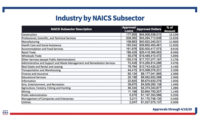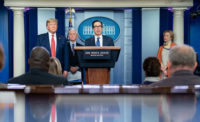The U.S. Senate approved on April 21 a compromise measure to inject $310 billion into the now-empty Paycheck Protection Program (PPP)—which aims to assist financially strapped small businesses, including those in construction, engineering and building materials—with forgivable loans to help them cope with economic blows struck by the coronavirus pandemic.
The next step is action by the House of Representatives, which could come in the next couple of days.
The bill, which the Senate passed unanimously, was the product of days of negotiations among key Republican and Democratic lawmakers and the Trump administration.
Besides the PPP infusion, the package also includes $75 billion to help hospitals and health-care workers, the front lines in the COVID-19 fight, plus $25 billion for expanded virus testing, as well as research and development at the federal Centers for Disease Control and Prevention and the National Institutes of Health.
In addition, the measure includes $50 billion for U.S. Small Business Administration disaster relief loans and $10 billion in SBA disaster grants.
PPP, which the agency administers, was created in the Coronavirus Aid, Relief and Economic Security (CARES) Act, which President Trump signed into law on March 27.
PPP, formally launched on April 3, quickly became flooded with requests from small companies and nonprofit organizations, and ran out of its $349 billion initial funding in less than two weeks.
Construction industry firms received the largest share of the initial batch of PPP loan dollars, with $44.9 billion, according to SBA.
Many more firms almost certainly had applied for loans and were waiting for them to be processed when the lending window closed on April 16. The new bill should provide a boost.
Stephen Sandherr, Associated General Contractors of America CEO said in a statement, "The new loan funding will help thousands of construction firms to retain essential construction jobs amid rapidly declining demand for construction services."
He noted that with more than half of construction companies facing cancelled or delayed projects, firms "are struggling to retain workers," adding that the pending bill "will help protect thousands of construction jobs, providing relief for our already hurting economy."
When it became clear that PPP dollars were running out, Republicans originally proposed adding $250 billion in new funds. It was a PPP-only bill.
Democrats supported more funding for the loan program but also pushed to add $150 billion for hospitals, which have been unable to carry out their pre-pandemic volumes of revenue-producing medical procedures, and another $150 billion for state and local governments, whose income has been slashed by a decline in tax receipts.
Senate Majority Leader Mitch McConnell (R-Ky.) said on the chamber's floor before the vote, "This is a significant package." He added, "It's unfortunate that it took our Democratic colleagues 12 days to agree to a deal that contains essentially nothing that Republicans ever opposed."
To address criticism that some small firms were shut out of the initial round of PPP loans because they lacked the banking relationships that large companies have, the final bill sets aside $30 biliion of the $310 billion for community-based financial institutions, small banks and credit unions and another $30 billion for medium-sized banks and credit unions.
The new package has about two-thirds of the amount Democrats proposed for hospitals and health care, but it has nothing in aid for states and localities.
Senate Minority leader Chuck Schumer (D-N.Y.) said on the Senate floor that he was “sorely disappointed” that state and local government funding did not make it into the pending measure.
But Schumer told reporters in a press conference after the vote that he got a commitment from Trump and Treasury Secretary Steven Mnuchin—the administration's chief negotiator on recent legislation—that states and localities will be able to use funds from the three earlier COVID-related laws to narrow their revenue gaps.
"There will be a a big, broad, bold 'COVID-4' [bill]," Schumer said. "For anyone who thinks this is the last train out of the station, that is not even close to the case."
Schumer said it would include help for the U.S. Postal Service and "a big, robust state and local plan."
House Speaker Nancy Pelosi also noted that, along with still more aid for states and localities, Democrats would seek further funding for hospitals.
At a White House briefing, Mnuchin noted that Trump had said the administration was looking forward to a "phase four" bill, adding that "it would be infrastructure."
Mnuchin added, "The President has been talking about infrastructure since the campaign: roads, bridges, broadband. Especially, broadband now to rural America is very important."
He also said administration officials "have talked about" provisions to help restaurants, sports and entertainment businesses and is aware of states' "fiscal issues." Trump has also mentioned a payroll tax cut, Mnuchin noted.
Schumer acknowledged that Trump favors an infrastructure measure, but Schumer and Pelosi did not say whether they also want to see a public works component in the next COVID-related bill.




Post a comment to this article
Report Abusive Comment